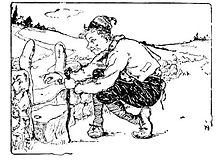
Summary
"There Was a Crooked Man" is an English nursery rhyme. It has a Roud Folk Song Index number of 1826.[1]
| "There Was a Crooked Man" | |
|---|---|
 | |
| Nursery rhyme | |
| Published | 1842 |
| Songwriter(s) | Unknown |


Origin edit
The rhyme was first recorded in print by James Orchard Halliwell in 1842:[2]
- There was a crooked man and he went a crooked mile,
- He found a crooked sixpence against a crooked stile;
- He bought a crooked cat, which caught a crooked mouse,
- And they all liv'd together in a little crooked house.
It gained popularity in the early twentieth century.[3] One legend suggests[4] that this nursery rhyme originated in the once prosperous wool merchant's village of Lavenham, about 70 miles northeast of London, having been inspired by its multicolored half-timbered houses leaning at irregular angles as if they are supporting each other. One Lavenham house in particular, 'The Crooked House' is often cited as the inspiration for the rhyme.[5]
Other sources[6] state that the poem originates from British history, specifically the period of the Scottish Stuart King Charles I of England (reigned 1625–1649). The crooked man is reputed to be the Scottish General Sir Alexander Leslie, who signed a covenant securing religious and political freedom for Scotland. The "crooked stile" in the poem was the alliance between the parliaments of England and Scotland or the border between the two, depending on the source. "They all lived together in a little crooked house" refers to the fact that the English and Scots had at last come to an agreement, despite the continuing great animosity between the two peoples, who nonetheless had to live with each other due to their common border.[7][8]
The great recoinage around 1696 led to sixpence coins that were made of very thin silver and were easily bent, becoming "crooked".[9]
References edit
- ^ "Roud Folksong Index S299349 There was a crooked man and he walked a crooked mile". Vaughan Williams Memorial Library. English Folk Dance and Song Society. Retrieved 20 May 2016.
- ^ Halliwell, James Orchard (1842). The Nursery Rhymes of England. London: C. Richards. p. 30.
- ^ I. Opie and P. Opie, The Oxford Dictionary of Nursery Rhymes (Oxford University Press, 1951, 2nd edn., 1997), p. 340.
- ^ Taylor, Bob (12 September 2011). "Lavenham, England: Part one of four great little places". Washington Times. Archived from the original on 6 October 2014. Retrieved 5 November 2016.
- ^ Watkins, Flora (7 May 2022). "What it's like to live in the world's most famous crooked house". Country Life. Retrieved 21 March 2023.
- ^ Alchin, Linda (2013). "There was a Crooked Man". The Secret History of Nursery Rhymes (2nd ed.). Surrey, UK: Neilsen.
- ^ Here Comes A Chopper to Chop Off Your Head - The Dark Side of Childhood
- ^ The Secret History of Nursery Rhymes Page 43
- ^ The British Almanac, 1856, page 17


